|
|
|
Sort Order |
|
|
|
Items / Page
|
|
|
|
|
|
|
| Srl | Item |
| 1 |
ID:
172515


|
|
|
|
|
| Summary/Abstract |
In this article we argue that the EU suffers from autoimmunity: a self-harming protection strategy. Drawing on Derrida’s political understanding of autoimmunity, we contend that the root of this malfunction lies in the EU’s own b/ordering and othering policies, which are intended to immunise the foundational ethos of the EU. For this purpose, we dissect the EU border regime into three linked b/ordering mechanisms: the pre-borders of paper documents that regulate from afar the mobility of the people from visa-obliged countries; the actual land borders often consisting of iron gates and fences regulating mobility on the spot; and the post-border in the form of waiting/detention camps that segregate and enclose the undocumented migrants after entry. We make clear how this discriminatory b/ordering and othering regime has led to a recurrent drawing of ever less porous, inhumane and deadlier borders. Such thanatopolitics finds itself at odds with the humanist values that the EU is supposed to uphold, particularly cross-border solidarity, openness, non-discrimination and human rights. We argue that the EU b/ordering regime has turned fear of the non-EUropean into an increasingly unquestioned – even ‘commonsensical’ – anxiety that has become politically profitable to exploit by extreme nationalistic and EUrosceptic parties. The core of the EU’s autoimmunity that we want to expose lies within this irony: in its attempt to protect what it considers meaningful, the EU has unleashed an autoimmune disorder that has turned the EU into its own most formidable threat.
|
|
|
|
|
|
|
|
|
|
|
|
|
|
|
|
| 2 |
ID:
172508
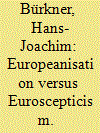

|
|
|
|
|
| Summary/Abstract |
Several overlapping crises which affected the EU during the past ten years have recently aggravated. Especially the progressing refugee crisis, the persisting financial crisis and geopolitical turmoil in the EU’s neighbourhood contributed to the rise of anti-EU movements and diverse articulations of Euroscepticism. Although public opinion and mainstream political analysis have easily identified right-wing populism as one of the most important drivers, it is still doubtful if it can be equated with Euroscepticism without further ado. To date it is by no means clear how and where Euroscepticism exactly originates.
|
|
|
|
|
|
|
|
|
|
|
|
|
|
|
|
| 3 |
ID:
172511


|
|
|
|
|
| Summary/Abstract |
Despite the EU accession of the Republic of Cyprus in 2004, the “Green Line” dividing Cyprus that was added as a border in 1974 remains an external EU-border between the Republic of Cyprus (RoC) and the Turkish Republic of Northern Cyprus (TRNC), a self-proclaimed state internationally recognized exclusively by Turkey. Pro- and con European attitudes on Cyprus are therefore not recent phenomena, but date back to the start of EU accession negotiations in 1998 and the Annan-Plan for reunification in 2004. These aspects, however, refer to the Turkish-Greek antagonism on the island and the ongoing national tensions that have resulted in violent conflicts since independence in 1960, the establishment of a demilitarized UN Buffer Zone in 1964 and the division of the island in 1974, also cutting through the island’s capital Nikosia/Lefkoşa. Drawing on fieldwork from 2004/2005 and 2014/2015 regarding the border’s shifting meanings and pointing to the border as a place where pro- and con-EU-articulations converge, emphasis is placed on the borderscape in Nikosia/Lefkoşa that impedes and increases the movement of people and goods. After all, the border is a dividing line that both shapes and exhibits identities. Moreover, it serves as an individual economic resource whilst border-crossings likewise offer benefits. Nevertheless, the border also stands as painful emotional remembrances for people on both sides. The pro- and con-EU attitudes that were dominant when the RoC joined the EU in 2004 have thus been blurred on both sides of the Green Line. The empirical research for this paper has been framed by the question of how this blurring is intertwined with the division of Cyprus and how people are affected by the Green Line as a socio-material and symbolic artefact on the micro-scale of personal feelings, identities and practices.
|
|
|
|
|
|
|
|
|
|
|
|
|
|
|
|
| 4 |
ID:
172510


|
|
|
|
|
| Summary/Abstract |
The policy of the European Union, which promotes a vision of Europe without borders and has fostered the development of cooperation across borders over 25 years, has led, in some parts of Europe, to the emergence of so-called integrated cross-border regions. Thus far, the increase of cross-border flows and interactions has always been a normative and almost unquestioned policy paradigm. However, tendencies of re-bordering and signs of growing Euroscepticism can also be observed nowadays in these border regions, which show the importance of investigating the negative externalities that can be generated by cross-border integration. This article attempts to do this by focusing on three case studies usually considered as among the most integrated ones in Europe because of cross-border flows related to work: the cross-border metropolitan regions of Basel, Geneva and Luxembourg. Our findings show that if several decades of cross-border integration have led to the reinforcement of the functional linkages between the border regions, some effects of the cross-border integration process have also created a functional specialisation of space that relies on social and economic inequalities. Such a situation contradicts the ideal of cross-border territorial cohesion and helps to better understand the rise of Euroscepticism in some of the border areas.
|
|
|
|
|
|
|
|
|
|
|
|
|
|
|
|
| 5 |
ID:
172513


|
|
|
|
|
| Summary/Abstract |
This essay contextualises Hungarian antipolitics of Europe as an element of radical conservative nation-building and as a reflection of the strategic use of borders. Two concrete examples of border politics will be elaborated that document shifts from EU-conformity to EU-contestation and the increasing political significance of culturalist arguments. These cases, moreover, are exemplary of the dual nature of then nationalist-conservative agenda which involves: 1) the implementation of an ethnopolitical and thus extraterritorial, de-bordered notion of nation and 2) the unilateral securitisation of Hungary’s borders, for example with Serbia, in a self-proclaimed defence of European integrity. The research that informs this essay is based on a review of media sources, academic and policy-focused literature. The essay begins with a discussion of links between Hungarian euroscepticism and the radical conservative nation-building project and continues with an analysis of post-1989 border politics with regards to the areas mentioned above. Considerable attention will be devoted to the Hungarian government’s politics of borders and contestations of European Union within the context of the so-called refugee crisis and wider debates regarding immigration and asylum.
|
|
|
|
|
|
|
|
|
|
|
|
|
|
|
|
| 6 |
ID:
172514
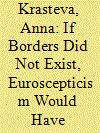

|
|
|
|
|
| Summary/Abstract |
The thesis of this article is that if borders did not exist, Euroscepticism would have invented them. If Sartre is paraphrased, it is to emphasize that Euroscepticism needs borders in the same intense political and symbolic way as anti-Semitism needs Jews. This thesis is argued in three steps. The first analyses the paradox of the intense theoretical deconstruction of borders in the era of an overbordered world and argues the ideas of the ‘revenge of the state’ and of the emergence of the ‘neo-post-Westphalian order’. The second part examines the post-communist Europeanisation as de-bordering and distinguishes three forms: Europeanisation through utopianization, Europeanisation through ethnic de-bordering and Europeanisation through de-territorialization. The third part analyses the interferences and intensification of re-bordering and Euroscepticism. The stato-national and the ethno-identitarian bordering practices are analysed through the images of wall and body. Two types of Euroscepticism – extremist and crypto – are distinguished and compared.
|
|
|
|
|
|
|
|
|
|
|
|
|
|
|
|
| 7 |
ID:
172516
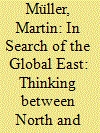

|
|
|
|
|
| Summary/Abstract |
Carving up the world into Global North and Global South has become an established way of thinking about global difference since the end of the Cold War. This binary, however, erases what this paper calls the Global East – those countries and societies that occupy an interstitial position between North and South. This paper problematises the geopolitics of knowledge that has resulted in the exclusion of the Global East, not just from the Global North and South, but from notions of globality in general. It argues that we need to adopt a strategic essentialism to recover the Global East for scholarship. To that end, it traces the global relations of IKEA’s bevelled drinking glass to demonstrate the urgency of rethinking the Global East at the heart of global connections, rather than separate from them. Thinking of such a Global East as a liminal space complicates the notions of North and South towards more inclusive but also more uncertain theorising.
|
|
|
|
|
|
|
|
|
|
|
|
|
|
|
|
| 8 |
ID:
172517


|
|
|
|
|
| Summary/Abstract |
This paper argues that the instrumental reference to Russian ‘compatriots’ in Georgia in 2008 and Ukraine in 2014 served as a discursive framing to justify contradictions in Russian approaches to state sovereignty to an international audience. Contrary to teleological readings of Russian foreign policy, however, the paper argues that while Russian diaspora policies have been tapped into, the iterative and partially contradictory development thereof on a governmental level suggests that these were not the blueprint for a revisionist foreign policy by design. It contextualizes the evolution of Russian diaspora policies against the background of the evolution of the wider ‘Russian World’ conception and shows how the discourse about the protection of ‘compatriots’ was contextual and has translated into geopolitical boundary-making at a time when relations between Russia and the West deteriorated.
|
|
|
|
|
|
|
|
|
|
|
|
|
|
|
|
| 9 |
ID:
172518
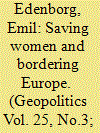

|
|
|
|
|
| Summary/Abstract |
This article maps the specific ways in which gendered and racialized boundary constructs create conditions of possibility for certain bordering practices. Connecting Critical Border Studies with feminist theories of geopolitics, it examines media reporting in Russia and Sweden about “migrants‘ sexual violence” in the wake of the 2015 New Years‘ events in Cologne. Despite contextual differences, in both countries these events were narrated as symbolic in negotiating Europe and its borders. In Russia, the events were connected to a story of a Russian girl in Berlin being raped by migrants (a story later revealed to be fabricated) and a narrative of Europe collapsing because of immigration. In Sweden, the events were connected to reports of sexual violence at festivals, sparking a debate about “Swedish values” of gender equality being endangered by immigration. The article argues, firstly, that narratives of migrants‘ sexual violence performed bordering functions in both the symbolic sense of delineating national identity and Europeanness, and the concrete sense of legitimating a stricter border regime. Secondly, it argues that the narratives performed that function only by tapping into local geopolitical narratives, in the Russian case on the country‘s ambivalent relation to Europe, and in Sweden the idea of gender exceptionalism.
|
|
|
|
|
|
|
|
|
|
|
|
|
|
|
|
| 10 |
ID:
172509


|
|
|
|
|
| Summary/Abstract |
This paper examines the role of Euroscepticism on regional cross-border cooperation between Germany and Denmark. It demonstrates that Euroscepticism, while absent from local mainstream politicians, had already caused civic unrest in the 1997 attempts to construct a return to history Euro-region Schleswig. It resulted in a re-scaling of the Euro-Region to Region and Schleswig to “Sønderjylland/Schleswig”, omitting any reference to Europe, European identity or a commitment to a closer European union in the relevant agreements. Border controls, on the agenda in 2011 and again since 2015, have demonstrated the institutional weakness of cross-border politics when faced with determined initiatives from the national center. Furthermore, the Eurosceptic Danish People’s Party had its best results in the border precincts both at the latest European and Danish national elections. Euroscepticism, even though difficult to measure on a regional level, seems to have been an ever present underneath current despite a political rhetoric of successful cooperation and cross-border reconciliation. The Danish-German case’s development might be more distinct, but nonetheless representative for European border (and cross-border) regions. While European metropolises develop into thriving cosmopolitan post-nation state societies, this is not necessary the case at Europe’s borders, where categorization and bordering remain common social practices by the large majority of national borderlanders with only a small portion of transnational borderlanders or ‘regionauts’ getting involved in border crossing social practices on a larger scale.
|
|
|
|
|
|
|
|
|
|
|
|
|
|
|
|
| 11 |
ID:
172512
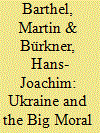

|
|
|
|
|
| Summary/Abstract |
Geopolitical shifts and the changing significance of borders in the EU’s neighbourhood are usually understood as a matter of international power politics. Factors that accompany geopolitical impact on borders, such as media coverage of geopolitical change, often appear as secondary or irrelevant. However the recent Ukraine conflict revealed the contrary as pro-EU attitudes were strongly supported by ‘western’ media. Therefore this paper seeks to clarify the role of news media in creating perspectives and attitudes on geopolitical shifts and the significance of European borders. Empirical evidence on the coverage of the evolving Ukraine crisis by German news sources portrays the media as promoters of biased framings and imaginaries which suggest that the EU be a potential conflict party in the newly evolving geostrategic confrontation in its eastern neighbourhood. The findings indicate that during critical periods of the Ukraine crisis media reports combined rising euphoria about Europe and ‘the West’, as defenders of the ‘good cause’, with excessive moral polarising and the discursive normalisation of a rhetoric of escalation. Imaginaries of a bipolar world (The West against Russia) and a new Cold War prepared the ground for a new understanding of European borders and neighbourhood relations as being manipulable at will.
|
|
|
|
|
|
|
|
|
|
|
|
|
|
|
|
|
|
|
|
|